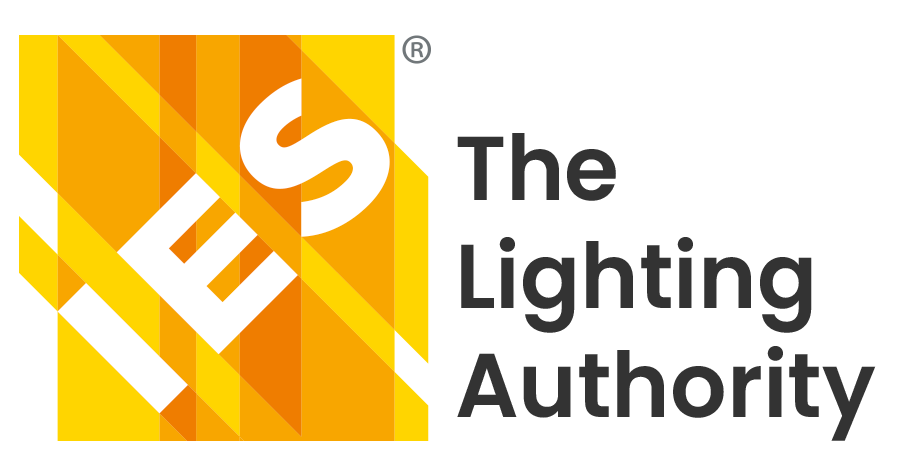
The Illuminating Engineering Society (IES) hosts “Light for Life,” an online education initiative exploring the impact of light on humans, plants, and animals. Presented as symposia or webinars, each program offers global perspectives and focuses on a distinct theme—ranging from security and museum lighting to sustainability and healthcare—demonstrating how light shapes diverse environments.
2025
Light for Life® Virtual Symposium
Sustainability
Welcome to the Light for Life®: Sustainability, a four (4) hour virtual symposium focused on the role of lighting in sustainable design and the impact of lighting on the environment.
Presentations curated to cover:
• Assessing the lighting life cycleLighting material impacts on human health
• Frameworks for pursuing sustainability goals
• Trends in sustainable luminaire production
• State of the industry and evolving design practices
Live registrants will receive a code for 25% off the purchase price of Lighting for Sustainability(BSR/IES LP-10) upon publication. They will also receive complimentary access to the elearningarchive, available approximately 2 weeks following the live event. Attendees will receive 4 IES continuing education credits (CEUs).
Light for Life® Virtual Symposium
Outdoor Spaces
Welcome to the Light for Life®: Outdoor Spaces, a four (4) hour virtual symposium focused on lighting design for pedestrian-oriented spaces, where people maneuver, shop, socialize, and rest during the darkness of nighttime hours.
Presentations curated to cover:
•Elements of design that impact mood, identity, and visual comfort
• Lighting zones, controls and color considerations
• Environmental issues important to flora and fauna
• New illuminance recommendations for outdoor spaces
Live registrants will receive a code for 25% off the purchase price of Lighting Design forOutdoor Pedestrian Applications (BSR/IES RP-43) upon publication. They will also receive complimentary access to the elearning archive, available approximately 2 weeks following the live event. Attendees will receive 4 IES continuing education credits (CEUs).
Light for Life® Symposium Special
Healthcare Environments: Lighting & Controls
Welcome to the Light for Life®: Healthcare Environments: Lighting & Controls , a special two day virtual symposium focused on the impact of lighting and light fixture selection for comfort, safety, productivity and function in healthcare environments. This symposium will be of extra interest to architects, interior designers, lighting designers, engineers and health system buyers.
Presentations curated to include:
• New Lighting Guidance
• Types of Facilities & Trends
• Controls for Healthcare
• Light and Vision
• Color and Material Perception
• Lighting Hospital and Healthcare Facilities
Live registrants will receive copies of RP-28 and RP-29. They will also receive complimentary access to the online recording, available approximately two weeks following the live event. Attendees will receive 10 IES continuing education credits (CEUs) for parts I & II, together with a certificate of completion.
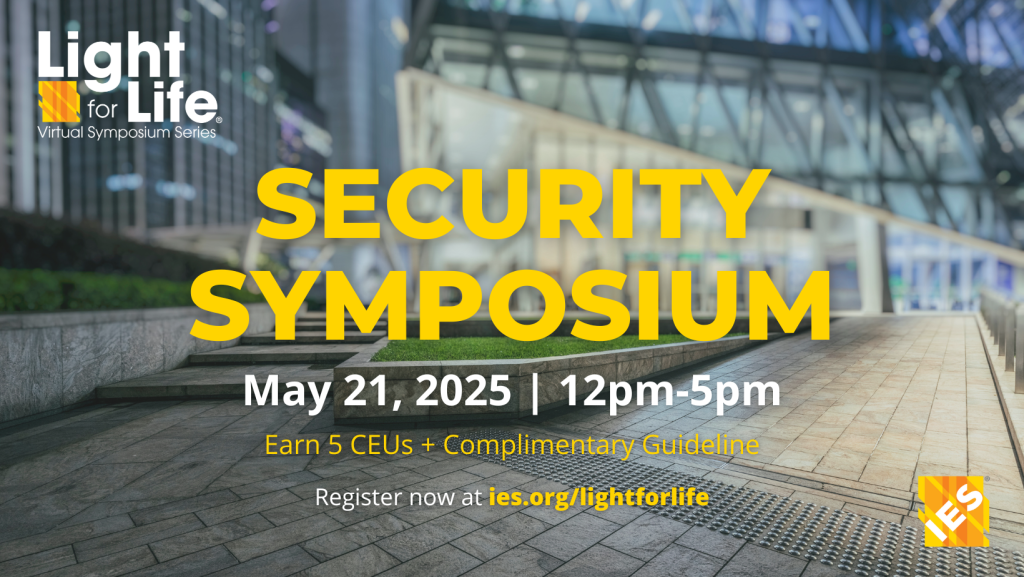
Light for Life® Virtual Symposium
Sustainability
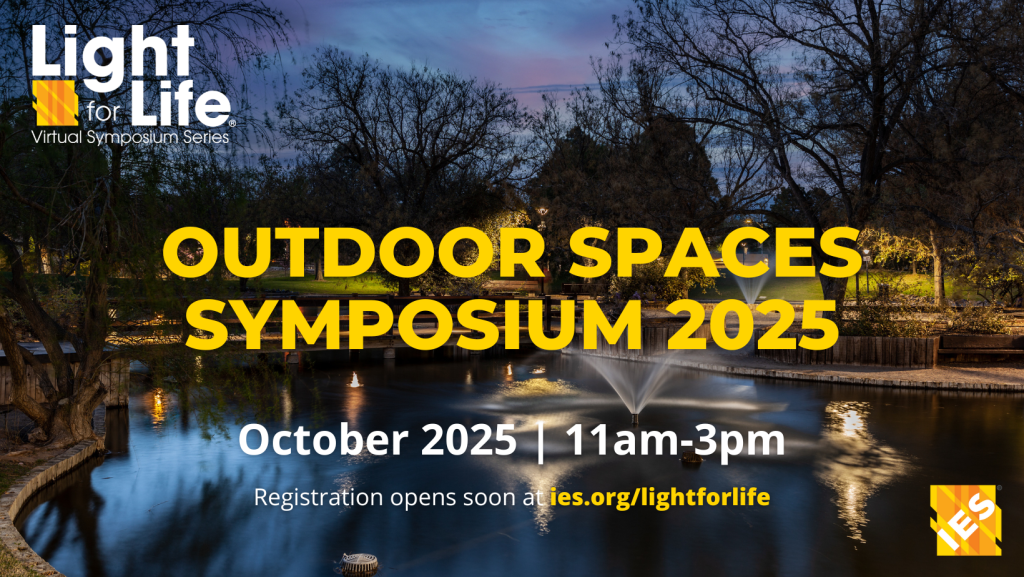
Light for Life® Virtual Symposium
Outdoor Spaces
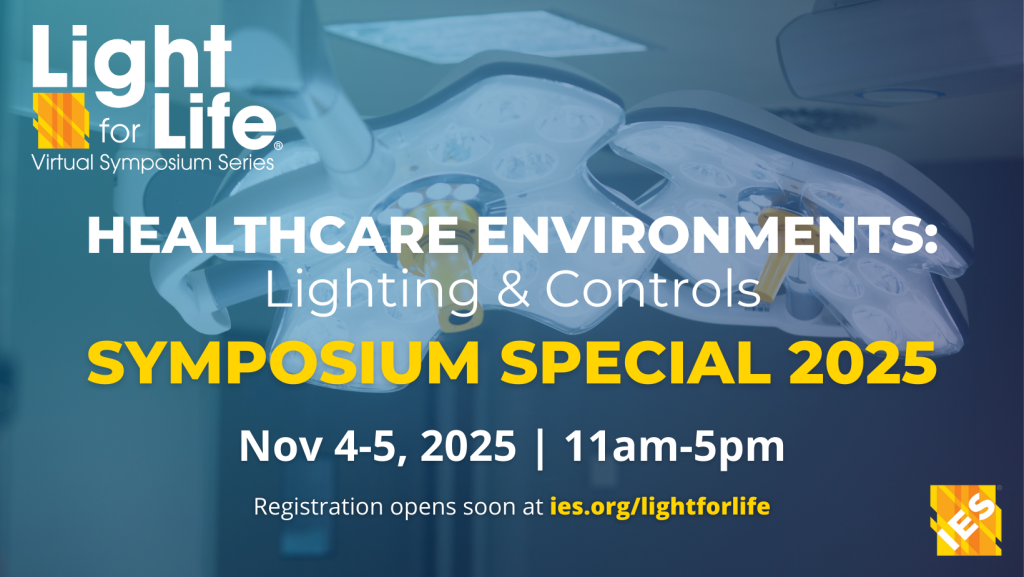
Light for Life® Symposium Special
Healthcare Environments: Lighting & Controls
Registration
Early Bird
Closes May 28
Regular
Agenda
Time
Function
Proposed Room
The History Of Lighting In New York City
Topic: Design
New York School Of Interior Design
*Additional Fee*
Time
Function
Proposed Room
Workshop: Light and Human Health: Putting the Recommended Practice into Professional Practice
Kimberly Mercier, George Brainard
Topic: Light & Human Health
*Additonal Fee*
Workshop: Photometry in Action
Craig Bernecker
Topic: Design
Location: Off-site @ Parsons School of Design
*Additonal Fee*
Workshop: Advanced Digital Tools for Daylighting Design
Nathan Sharnas, Reinhardt Swart
Topic: Emerging Technologies
*Additonal Fee*
Workshop: A Deep Dive Into Light Source Color Science
Tony Esposito
Topic: Lighting Science
*Additonal Fee*
Workshop: Getting Real with DALI: Beyond the Digital Buzz
Carol Jones, Michael Myer
Topic: Emerging Technologies
*Additonal Fee*
Time
Function
Proposed Room
Blinded by the Light? Reconsidering Street Lighting’s Impact on Crime Prevention
Nick Mesler
Topic: Humanities & Ethics
Illuminating “Current”- A Case Study on Public Art Suspension
Ardra Zinkon
Topic: Art & Process of Design
Everything DALI
Michael Davidson, Kevin Fitzmaurice
Topic: Emerging Technologies
Research Track: Paper Presentations
Two 30-Minute Presentations
Research Track: Paper Presentations
Two 30-Minute Presentations
Exterior Lighting for Durability, ESG and Circularity
Jason Osterman
Topic: Environment & Sustainability
What Does a Circadian Supportive Space Look Like? It Depends.
Nathan Sharnas, Matt Alleman
Topic: L&HH
Design to Programming, Key Insights and Lessons Learned in Lighting Control System Implementation
Brennan Schumacher, Lauren Schwade
Topic: Emerging Technologies
Research Track: Paper Presentations
Two 30-Minute Presentations
What Makes It Bright?
Michael Royer, Belal Abboushi
Topic: Emerging Technologies, Sustainability
Level Up Your Revit Workflow: Embracing Automation with Dynamo and ChatGPT
Amber Wu
pic: Emerging Technologies
Project Completion = Design Completion? Discussion about responsible Design Process
Meko Qini Huang
Topic: Art & Process of Design
Research Track: Paper Presentations
Two 30-Minute Presentations
Lights for All – Urban Lighting as an Agent of Sustainable Inclusion
Maria Fellows
Topic: Environment & Sustainability
Non-Visual Method for Determining Office Daylight Zones: Enhancing Energy Savings through Position and Viewing Direction Considerations
Shengliang Rong, Jianchuan Tan
Topic: Sustainability, L&HH
DALI for Lighting Designers… Less Surrealism, More Realism
Avraham Mor, Casey Diers
Topic: Art & Process of Design
Research Track: Paper Presentations
Two 30-Minute Presentations
Time
Function
Proposed Room
Breaking Dawn: The Challenges and Consequences of Light Pollution Remedies
Annika Jägerbrand, Alp Durmus, Maria Nilsson Tengelin
Topic: Environment & Sustainability
Mitigating Perception of Glare From Streetlights
Naomi Miller, Belal Abboushi
Topic: Other – Lighting Research
Research Track: Paper Presentations
Two 30-Minute Presentations
Community Centered Models in Practice: Expanding the Role of Lighting Design Beyond Arbitrators of Lux
Francesca Bastianini, Luciana Martinez, Iris Ahn
Topic: Art & Process of Design, Humanities & Ethics
What Is Semantic Interoperability and Why Should the Lighting Industry Care About It?
Michael Poplawski
Topic: Emerging Technologies
Research Track: Paper Presentations
Two 30-Minute Presentations
Research Track: Paper Presentations
One 30-Minute Presentations
Blinded by the Light? Reconsidering Street Lighting’s Impact on Crime Prevention
Nick Mesler
Topic: Humanities & Ethics
Illuminating “Current”- A Case Study on Public Art Suspension
Ardra Zinkon
Topic: Art & Process of Design
Everything DALI
Michael Davidson, Kevin Fitzmaurice
Topic: Emerging Technologies
Research Track: Paper Presentations
Two 30-Minute Presentations
Research Track: Paper Presentations
Two 30-Minute Presentations
Hospitality Lighting: ANSI/IES RP-9 Leading the Way Beyond Calculations
Emlyn Altman, Chip Israel
Topic: Art & Process of Design
School Adoption of LEDs is Lagging – Why?
Jessica Collier Kelly, Alexandra Christiana, Andrea Wilkerson
Topic: Emerging Technologies, Sustainability
Research Track: Paper Presentations
Two 30-Minute Presentations
Next Steps for Lighting Education
Daniel Blitzer, Tom Butters, Marc Hodges, Bob Preston
Topic: Professional Practices/Lighting Education
EPD, LCA, PCR…Making Sense of Environmental Declaration Alphabet Soup
Harold Jepsen, Aaron Smith, Chris Fournier, Debbie Melton
Topic: Environment & Sustainability
Research Track: Paper Presentations
Two 30-Minute Presentations
Modeling Light
Dan Weissman
Topic: Emerging Technologies, Art & Process of Design
*(working title) PoE and DC Systems
Moderator: Michael Poplawski
Panelists: TBD
Panel Session to be coordinated with and invted experts
Topic: Emerging Technologies
Research Track: Paper Presentations
Two 30-Minute Presentations
Accommodations
Hotel and Venue
The New York Marriott Marquis in Times Square is the center of IES24 Lighting Conference activities! At just $269 per room night, IES works to get the lowest room rate possible for all of our attendees.
Book your hotel room by July 22 to secure these great rates.

